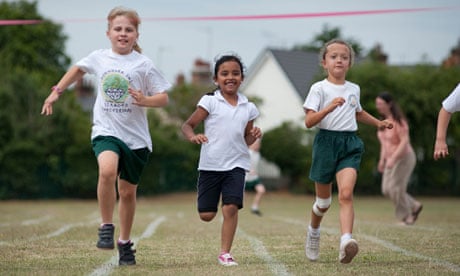School sports days are no longer competitive. That is what popular wisdom would have us believe. Of course, those who proclaim it most fervently are the sort of people who make curly finger signs in the air whenever they say "political correctness" or "health and safety", conveying an inexplicable degree of fury that their God-given right to cause others both offence and physical injury is being curbed. But do they have a point?
In the spirit of investigative journalism for which this newspaper is famed, I am writing this having just returned from my daughter's sports day – at which, incidentally, she won the 100m sprint. You will have gathered from this that her school operates a pretty traditional kind of event.
It wasn't ever thus. In the past I have seen various bewildering team activities, such as passing a quoit backwards through a line of sack-wearing children jumping on balloons. But then just because an event doesn't involve running (at which my daughter – did I mention? – excelled) or jumping or chucking something, that doesn't mean it's not competitive.
In my son's first term at nursery he took part in a dressing-up race. He ran to the first post as speedily as any of the other children. But when he got there and found on the ground before him a big sweater that he was expected to put on before running onwards, he did what he always did when getting dressed in the mornings: he stood still, put his arms up and waited for me to haul it over his head.
Don't tell me that race wasn't about winning and losing. It was just that the loser in question was clearly me, a mother who had failed to teach her child a basic life-skill.
Anyway, more recent sports days have consisted of traditional races, which children clearly win or lose. In my daughter's case, for instance, she won. I apologise if I've mentioned that already, but I think it is important to paint an accurate picture. So maybe the "political correctness" bashers are winning the day, and teachers are ritually humiliating young children simply to put a stop to certain parents' Clarksonian sneering. Or maybe it's because, as children get older, it becomes unfeasible to protect them from failure.
Is that a good thing? Perhaps you should ask the little boy who streaked ahead of the field for the first half of the 500m before realising, with evident horror, that what he had thought was the finishing line was actually the halfway mark. As he limped home, red-faced and gasping, seemingly hours after his rivals, I wonder if he felt like someone who'd learned a valuable life lesson, or just a bit of a numpty.
Children are going to fail at stuff. They do not have to be taught to do it. But it probably does not hurt them to see that it happens to everyone. And, particularly when the kids who don't shine in the classroom get a chance to show off in some other arena, I reckon that affording them a moment of glory is an admirable thing.
My only concern, in an age when children take part in less physical activity than is good for them, is that the pressure to succeed can suck all the joy out of it and make them even less likely to think of sport as fun. The flipside of that is that a child like my daughter – who, although she loves dancing and long walks, has never considered herself to be sporty – was clearly delighted to find herself a winner. (I did mention that she came first in the 100m sprint, didn't I? I'd hate you to fail to grasp that point.)
I myself was that stereotypically swotty child who never understood the rules of netball. But I am sure that my own sporting achievement (year eight egg-and-spoon race) helped to nurture in me a can-do sense of ambition. It seems to me that, as long as we all emphasise that it's the taking part, not the winning, that counts, a little competition is probably no bad thing. And that's the message I gave my daughter shortly before she sped her way to glorious, unequivocal victory.
